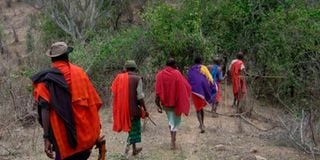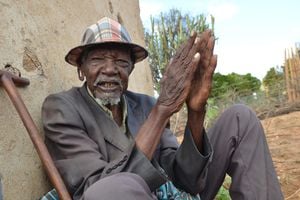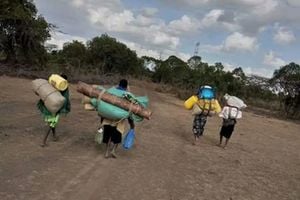
Maasai elders from Laikipia head to Mukogodo forest in a row seeking intervention from God to open the skies and save the region from drought.
Until five years ago, Mukogodo Forest in Laikipia county prided itself as a unique natural resource.
Indeed, the Kenya Forest Service (KFS) regarded the virgin resource as a model of community driven conservation efforts, not only in Kenya but in other East African nations, and would host visitors on learning tours.
Though a gazetted government forest, the 700 acres of diverse species of flora and fauna owe its conservation success story to the commitment of the neighbouring community with the few KFS rangers present playing a negligible role such as responding to fire outbreaks.
Strict rules had been formulated by the Maasai herders to ensure the community protects 45 mammals, 209 birds’ species and 200 species of indigenous trees including the endangered sandal wood. Anyone who dared flout the regulations was heavily fined by an elder’s court.
It was a traditional governance system, carried through generations since Yiaku, a hunters and gatherers community settled in the forest some 4,000 years ago.
Historians say the Maasais were concentrated in the “Dorobo Reserve” (now Mukogodo) in 1936 by colonialists who bought land and settled in the Laikipia plateau.
Once in the forest, the Maasai who are traditionally pastoralists had to develop suitable economic and political structures in order to ensure their survival in the harsh environment driven by the need to conserve grazing areas and protect vital water sources.
The forest was also a source of firewood which was collected through strict guidance, herbs, honey and natural dyes with some sites set aside for cultural rituals such as circumcision and traditional sanctuaries.
It is estimated that more than 5,000 people reside inside the forest in Kuri Kuri, Ar Kinyei, Tassia, Nadung’oro and Lokusero villages.
But this harmony between man and nature was rudely disrupted in 2018 when armed herders arrived from neighbouring counties and turned the forest into their home. Political patronage was cited as the cause of the invasion with a local politician being fingered by security agencies for inciting his supporters to take over private and communally owned lands.
For six years now, Mukogodo forest has become a bandit’s paradise where criminals attack neighbouring communities with impunity, kill, maim, destroy property and steal livestock before retreating to their hideout. It is estimated that migrating herders have taken control of a third of the forest where they have put up manyattas and turned the rest of the area into grazing lands.
When Cabinet Secretary for Interior Kithure Kindiki announced early last year an all-out war on bandits that have been causing terror in the North Rift region, Mukogodo Forest was among areas declared “disturbed and dangerous” where a multi-agency security team including Kenya Defence Forces (KDF) was tasked with restoring peace and security. To the Laikipia North residents who have borne the brunt of insecurity, the plans to have the bandits flushed out of the forest was music to their ears. Previous protests over deteriorating insecurity have only been met with promises with little action by the security agencies.
Several pledges have been made by senior State officials that the bandits would be smoked out from their hideout. The first promise was made in December 2022 by Prof Kindiki when he visited Mukogodo West Ward following the killing of Ilmotiok Chief Jacob Eyangire. The cold blooded murder was blamed on criminals who occasionally launch attacks on the neighbouhood and then retreat to the safety of the forest’s thicket where security officers cannot dare to venture.
But despite the tough warning issued by the Cabinet secretary and repeated by county security chiefs, little has happened since declaration of war on the bandits. Frequent raids have become a common occurrence and homesteads of prominent people have not been spared either. Former National Assembly Speaker Francis Kaparo has fallen victim with his herdsman being shot dead by the bandits who also stole several camels.
Private ranches have also been targeted including Enasoit Ranch where last year the bandits drove away 75 head of cattle but were later intercepted by security officers on the edges of Mukogodo forest where a fierce fire exchange ensued leading to the recovery of all the stolen animals. There were casualties on both sides with a National Police Service (NPR) officer Stephen Morijo sustaining gunshot wounds and currently recuperating in hospital. After the incidence, Prof Kindiki made yet another visit to Laikipia where he announced the launch of a multi-agency security operation to rid the forest of the bandits.
“I am directing civilians to leave Mukogodo Forest as security officers will be moving any minute from now for a major operation. Anyone found inside the forest from now on will be treated as a criminal,” warned the CS.
But his directive was met with scepticism with local leaders and conservationists questioning the government’s commitment to the resolve.
Mukogodo East MCA Paul Leshuel noted that previously when the community complied with the government directive and moved to temporary camps with their livestock; it only provided a better opportunity for criminals to stage raids and steal the animals gathered together at the temporary dwellings.
His Mukogodo West Ward counterpart Nicholas Lempaira argues that the only way to lock out bandits and armed illegal herders is to put permanent camps for security officers deep inside the forest.
Raids by armed cattle rustlers have intensified in the last one month within Mukogodo East Ward prompting locals to hold protests to the county commissioners office. It is an open secret that the forest has become a conduit for the bandits who normally drive the animals to Kipsing location in Isiolo and Wamba in Samburu county.
More than 200 head of cattle including grade cows owned by the farming community in the neighbouring Meru county have been stolen since the beginning of April. This prompted local political leadership to convene a meeting last Wednesday to demand action by the government.
Also Read: Mop up illegal guns in Meru, MP says
Laikipia East MP Mwangi Kiunjuri and his Laikipia North counterpart Sarah Korere accused security officers of turning a blind eye to the insecurity menace.
Ilmamusi Community Forest Association (CFA) which brings together villagers bordering the forest for purposes of conservation are worried about the forest destruction.
The CFA chairman Wilfred Mejori says they launched have already developed a five-year management plan for the Mukogodo Forest which was launched in May last year with one of the objectives being to restore the lost glory of this natural resource.
“The illegal herders have caused massive destruction to our valued heritage that has been preserved for years by our forefathers. We are planning to plant 50,000 indigenous trees in the next five years to replace the ones destroyed by the invaders and in so doing we shall protect critical water sources that have supported us for years,” said Mr Mejori.












